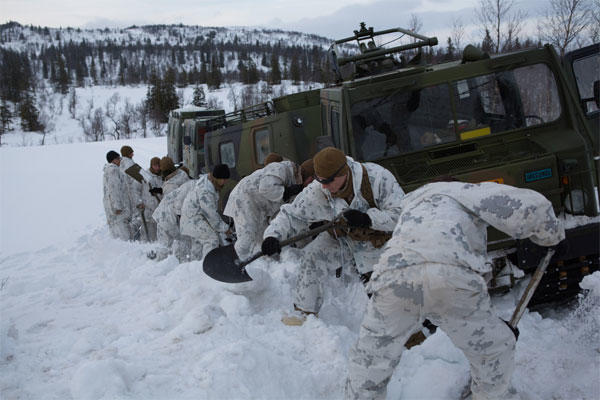The temperature in Trondheim, Norway, may climb to around the 20 degrees Fahrenheit, but that's cold enough to throw Marine units used to training in the North Carolina heat off their game.
Some 1,900 Marines with Camp Lejeune's 2nd Marine Expeditionary Brigade and other units are now preparing for a nine-day live-fire exercise designed to test their ability to operate in the cold and snow.
Known as Cold Response, the exercise is an annual challenge that is notable this year for its sheer size: In all, 16,000 troops from 15 different countries are set to participate. The operations officer of 2nd MEB, Col. Will Bentley, told Military.com a comparable-sized force had not assembled in the region for an exercise since 1995.
For the Marines, the exercise serves a dual purpose: In addition to training with allies and counterparts, the Norway deployment gives them the opportunity to inspect military gear stowed away in climate-controlled caves, waiting for the next mission on this side of the world.
Part of an initiative called Marine Corps Prepositioning Program-Norway, the caves first opened in 1982 and now hold enough gear to support the operations of a 15,000-man Marine expeditionary brigade for 30 days.
Bentley said he had been impressed with the quality and the condition of the equipment stowed in the caves as it was hauled out for inspection.
"All the gear is just immaculate, inside and out," he said. "Everything is just in extremely good condition."
Apart from a small issue that had to be fixed on a Marine Corps assault amphibious vehicle, he said, the gear was ready to use.
In addition to the gear in the caves, the Marines brought with them about 6,000 major pieces of equipment for the upcoming exercise, including tanks, AAVs, artillery pieces, Humvees and support equipment -- "a logistician's dream," Bentley said.
The live-maneuver exercise will run March 1 to March 9, featuring two battling notional forces and allowing troops to practice higher headquarters and control group operations as well as live fire and movements in the snow.
According to Marine Corps officials, this is the first Cold Response exercise that will feature Marine explosive ordnance disposal technicians, who will work and train alongside Norwegian explosive ordnance disposal, or EOD, technicians as they learn how cold weather and snowy conditions affect their operations.
Although the weather has been comparably temperate for the Arctic Circle, Bentley said it's cold enough to highlight the challenges of working in a new environment and force Marines to learn how to do familiar tasks in a new way.
"Getting out of a vehicle, your perspiration freezes almost immediately. It's learning how to take gear off to do heavy work, then putting it back on to maintain warmth," he said. "Communication, the ability to formulate words gets difficult in the cold … it's just part of learning as we go."
-- Hope Hodge Seck can be reached at hope.seck@military.com. Follow her on Twitter at @HopeSeck.




























